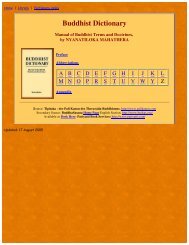The Three Basic Facts of Existence II: Suffering (Dukkha) - Buddhist ...
The Three Basic Facts of Existence II: Suffering (Dukkha) - Buddhist ...
The Three Basic Facts of Existence II: Suffering (Dukkha) - Buddhist ...
- No tags were found...
You also want an ePaper? Increase the reach of your titles
YUMPU automatically turns print PDFs into web optimized ePapers that Google loves.
IV. Anguish—the Mark <strong>of</strong> Man”<strong>The</strong> existentialist says at once that man is anguish.” 8Man’s nature is the nature <strong>of</strong> dukkha—his life marked by unease, his mind a restlessnessoscillating between the discomfort <strong>of</strong> pain and “that unrest which men miscall delight.” 9 Yaṃkiñci vedayitaṃ tam dukkhasmin’ti, said the Buddha—“Whatever is felt is included in dukkha.” 10This is echoed today by our leading thinkers—“Human reality therefore is by nature anunhappy consciousness with no possibility <strong>of</strong> surpassing its unhappy state.” 11It is a reality that many seek to avoid seeing, 12 but let us instead look closer: Man’s physicalsurvival alone requires the sorrow <strong>of</strong> ceaseless labour. A Hebrew poet three thousand years agoknew the grief <strong>of</strong> the labouring man “for all his days are sorrows, and his travail grief, yea, hisheart taketh not rest in the night.” 13 Modern man sometimes has other choices but the cynicalwould see little relief: “<strong>The</strong> lot <strong>of</strong> man is ceaseless labour, or ceaseless idleness, which is stillharder. Or irregular labour, which is not pleasant.” 14 Yet his labour comes to nought “for whatpr<strong>of</strong>it hath a man <strong>of</strong> all his labour?” 15 Few gain real joy from leaving the fruits <strong>of</strong> their labour toa posterity we shall not see—“what has posterity ever done for us,” this is the thought <strong>of</strong> most.So his labour is tainted with futility:“Between the idea and the reality,between the motion and the act,falls the shadow.” 16He knows the truth <strong>of</strong> aniccatâ (change) that all will fade “and leave not a rack behind,” 17 for “allour yesterdays have lighted fools the way to dusty death.” 18 And so the tragic tale ends withdeath, the final absurdity for the materialist, and his haunting fear: “I will show you fear in ahandful <strong>of</strong> dust.” 19 <strong>The</strong> body that requires so much labour to attend must end as dust thatremains like Yorik’s skull a dumb testimony to fools that grasp at life.—“<strong>The</strong> history <strong>of</strong> a life,whatever it may be, is the history <strong>of</strong> a failure.” 20And what <strong>of</strong> the kingdom <strong>of</strong> the mind? It is a kingdom ill at ease. A ceaseless want, anegative, seeking to ingest life: this characterises the mental structure <strong>of</strong> man. It’s nutriments aresense-contact, intention and awareness; 21 nothing so well describes man’s being as that <strong>of</strong> aninsatiate digestive system. This ceaseless want (taṇhā) is the “irritant” that motivates man, 22 itgoads him into the agitation, the burning and subtle “pain” <strong>of</strong> “pleasure” to lead only to the8Jean-Paul Sartre, L’Existentialisme est un humanisme, 1946.9Shelley: Adonis.10SN 35:11.11J.P. Sartre: “L’Etre et le Neant” p.66 (this and further refs. to the English translation <strong>of</strong> Hazel Barnes:Citadel Press).12“Human kind cannot bear very much reality”, T. S. Eliot: Burnt Norton.13Ecclesiastes <strong>II</strong>, v. 23.14T. S. Eliot: Choruses from the Rock.15Ecclesiastes I, v. 3.16T. S. Eliot: <strong>The</strong> Hollow Men.17Shakespeare: <strong>The</strong> Tempest, 1, iv, 156.18Shakespeare: Macbeth, 5, v, 20.19T. S. Eliot: <strong>The</strong> Waste Land.20Sartre: op. cit., p. 457.21Nutriment or sustaining factors <strong>of</strong> life (áhára) were defined by the Buddha as material food(kabaliòkáráhára) and the mental needs sense-contact (phassa), volition (manosañcetaná) and consciousness(viññáóa).15
















